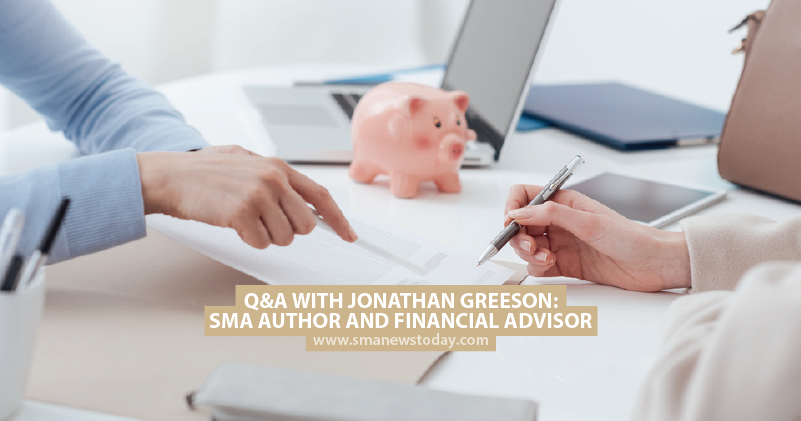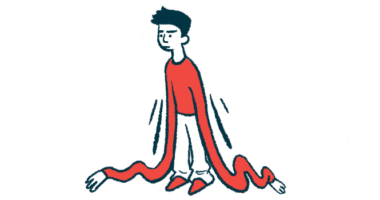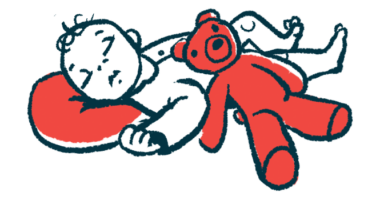Q&A With Jonathan Greeson: SMA Author and Financial Advisor

Jonathan Greeson is an SMA author, financial advisor and the founder of the North Carolina Electric Wheelchair Hockey Association (N.C.E.W.H.A.). After graduating from North Carolina State University with a degree in business administration, Greeson spent years working to become a financial advisor.
During this time, he also founded the N.C.E.W.H.A. and played in the organization. In 2010, he published his book My Online Angel, which examines inter-abled romance through a personal relationship he experienced in his mid-twenties. He now has his own financial planning practice in his hometown of Pikeville, North Carolina.
Greeson was kind enough to answer some of our most pressing questions.
Kevin Schaefer: How did you go about starting your own financial planning practice?
Jonathan Greeson: That was about a 20-year process. The goal was always to be a financial planner. I knew exactly what I wanted to do before I even applied to college. After graduation, I applied with big firms just like everyone else, but it never worked out. I don’t really think I was discriminated against, but there are just some things I am unable to do. I can’t talk a client into a deal on the golf course or do sales pitches at someone’s house because it may not be accessible.
So, I had to find my own way. As you know, we have income restrictions with disability, so my business needs to be built slowly anyway. What others may view as a hindrance, I saw it as an opportunity. Big firms don’t pay attention to the “small” client because the fees are low. By focusing on the “small” client and helping them grow, my practice has the slow growth it needs to give the stability I need to actually get off the system. Most importantly, however, my philosophy helps me reach the people who need financial assistance the most.
Our job as planners shouldn’t be just moving an investment account into our firm, it should be about helping the client with the entirety of their financial situation. When the right group finally understood what I was trying to do, they gave me the opportunity to provide their services in my practice. I still have a long way to go, but it will get where it needs to be in due time.
KS: What does your day-to-day work life entail?
JG: The best days are when I have client meetings. I love to help them work through their concerns and see if I can help them. If I can help, then I get to work on plans for them or open different types of investment accounts. Just as any advisor/planner will tell you, most days are spent trying to find new clients.
Most of the client prospecting work can be done from home. My office is open by appointment only, so that helps as well. It’s just easier for me and my caregivers to do most work from home instead of being in the office all day. Most of the time I am doing whatever I can just to get the word out about my services.
MORE: Five tips for going to college when you have SMA
KS: You were also the founder of the North Carolina Electric Wheelchair Hockey Association. What was that experience like and how do you feel it benefitted people with disabilities?
JG: Well, I can honestly say I wouldn’t be a financial planner without hockey. One of our referee volunteers was the guy who gave me the opportunity to start a practice.
Hockey also prepared me for the next step. It helped me realize that I could do anything when, if I’m being honest, I did have some doubts after not getting my dream job directly after college. Now when I have any doubts I just remind myself that I traveled all over the USA and Canada playing hockey in a wheelchair. If I could raise money and actually do that, then providing a service that everyone needs should be easy. I hope my teammates and anyone who saw us play feel the same way as they pursue their dreams.
KS: Your book My Online Angel addresses inter-abled romance in a unique way. It’s your personal story about an online relationship that you experienced. I appreciate your honesty in it, as it’s a subject our society tends to shy away from. From your perspective, how might the discussion about disability and dating be expanded upon?
JG: I think the only way is honesty on both sides. I think as a man with a disability, I should have the courage to talk to any woman I find attractive. I also think she should be honest enough to tell me if she isn’t interested. It is ok to just be friends with someone. However, I also think it’s important for me to be understanding if the woman isn’t interested.
If we want equal opportunity and honesty, then we have to be prepared to feel rejection. It’s not fun or easy, but honesty can open the doors to some of the best friendships you’ll have. When you look back on your life, it won’t be about sexual conquests or whatever, it will be about the people you reached. If we can reach people and show them not to fear a disability, then the relationship will be easy to work out with the right person.
For more information about Greeson and his practice, visit his website.
MORE: Three benefits of aquatic therapy when you have SMA
SMA News Today is strictly a news and information website about the disease. It does not provide medical advice, diagnosis or treatment. This content is not intended to be a substitute for professional medical advice, diagnosis, or treatment. Always seek the advice of your physician or another qualified health provider with any questions you may have regarding a medical condition. Never disregard professional medical advice or delay in seeking it because of something you have read on this website.







